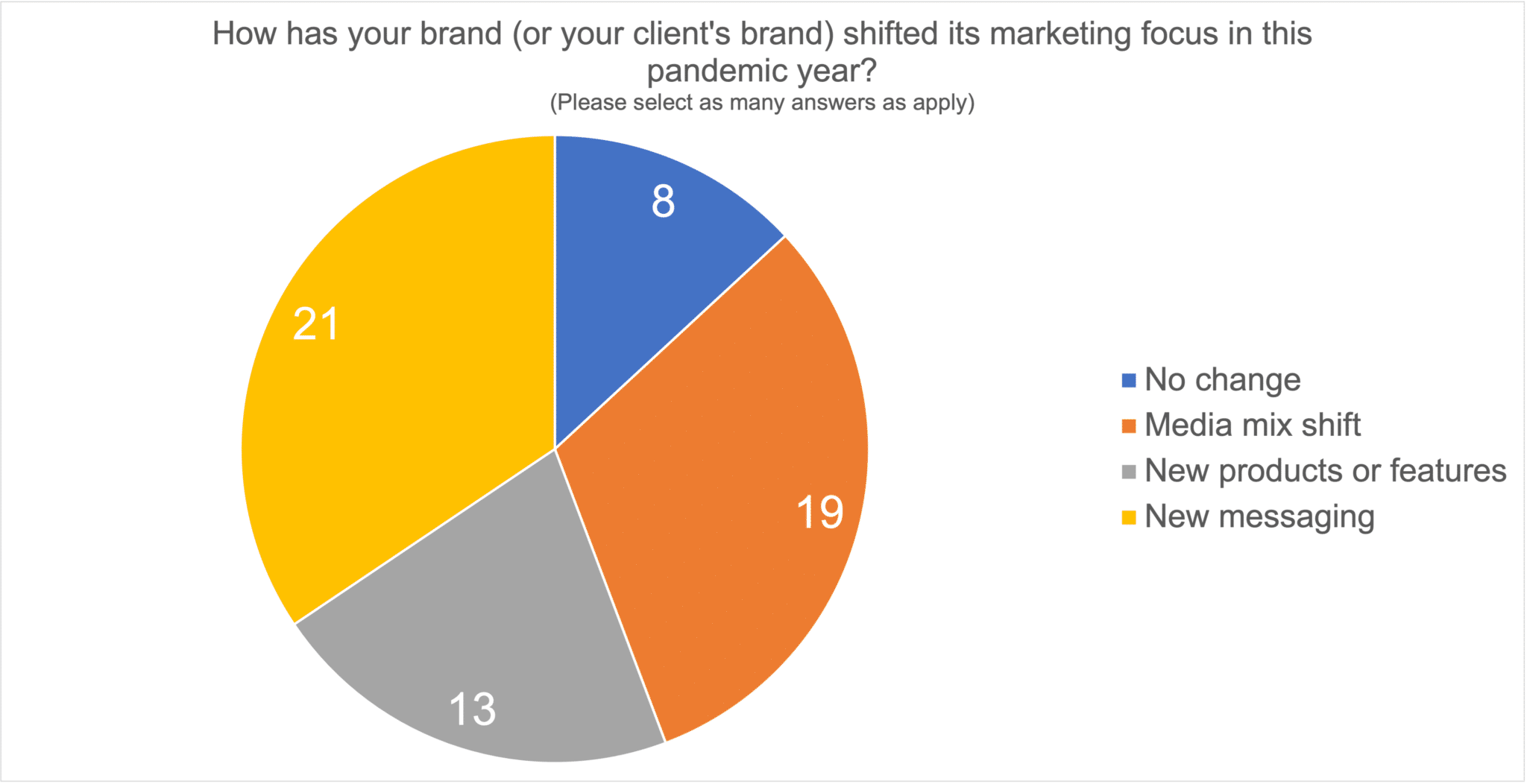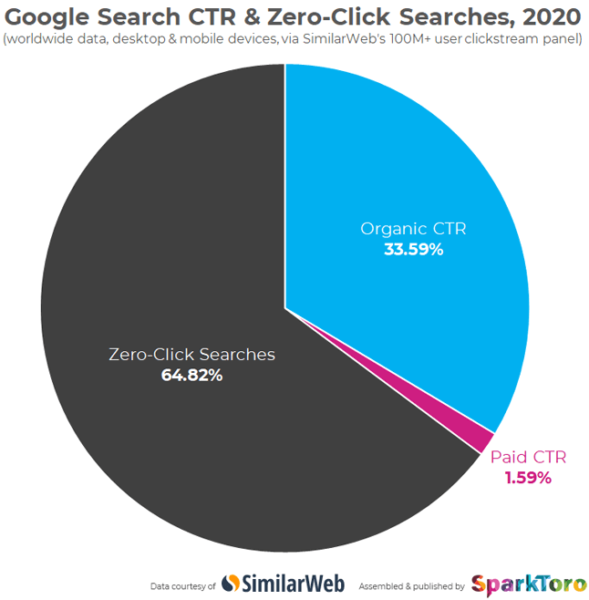Changes are afoot, and this time they’re going in the right direction; Tuesday’s daily brief
Plus, register for SMX Create
Search Engine Land’s daily brief features daily insights, news, tips, and essential bits of wisdom for today’s search marketer. If you would like to read this before the rest of the internet does, sign up here to get it delivered to your inbox daily.
Good morning, Marketers, are things turning the corner in your business?
Last week, I had the sad occasion to attend a funeral (yes, in person) and, surprisingly, I emerged with a great sense of hope. Besides myself, a great number of the attendees, especially the elderly, were fully vaccinated. Though everyone wore masks and generally socially distanced, I exchanged hugs with a few folks and have begun to see the light at the end of the tunnel. Here’s hoping you’re experiencing the same or that you will soon.
Though I didn’t get a significant number of responses to last week’s survey question, I found it interesting that a lot of folks reported not having changed anything about their marketing in response to the COVID pandemic. Meanwhile, a few changed all three aspects we asked about — messaging, media mix and new product offerings. The two most-changed items were messaging and media mix, perhaps because they were the easiest to shift. See the chart below for more details.
Speaking of turning a corner, this week we’re asking about your expectations around attending in-person events in the coming months. Things have been looking a lot more positive lately, and we’re looking forward to convening in person as soon as it makes sense. Please take our very short survey and let us know your thoughts.
Pamela Parker,
Research Director
Most common pandemic shifts were in messaging and media mix

It’s more anecdotal than statistically significant, but of 47 respondents to last week’s survey (people could choose more than one answer), some said they did not change anything about their marketing in the past year. The most common shifts were to change marketing messaging or the media mix, though many also launched new products or features to appeal to pandemic-era customers.
Zero-click Google searches rose to nearly 65% in 2020

In 2019, we reported that zero-click searches in Google broke the 50% milestone. Now, that figure is closer to two-thirds of searches, according to Rand Fishkin of SparkToro.
The pandemic may also have increased overall search volume. On desktop, 46.5% of searches were zero-click, compared to 77.2% on mobile devices. As people become more mobile thanks to vaccine rollouts, the overall proportion of zero-click searches may also increase as a result.
These figures are especially noteworthy given all the antitrust scrutiny that Google finds itself under. Zero-click searches are at an all-time high, but efforts to regulate the company, like the Android search choice screen in the EU and the Australian News Media Bargaining Code, have not panned out the way regulators may have imagined.
Businesses that Google competes with directly, like online travel agencies or review platforms, maybe feeling the pinch on their organic traffic. But, an overall increase in search volume may mean more opportunities for businesses that Google doesn’t directly compete with.
Is your customer calling?
The telephone is often overlooked when we think about digital marketing, but it’s playing a critical role these days.
When faced with the worst public health crisis in more than a century, U.S. consumers used the telephone more than ever before. During the first half of 2020, Google My Business recorded a 61% jump in consumer calls, from inquiries about open hours to arrangements for curbside pickups. For the 12 months ending June 2020, call volume increased 35% and continues to track 27% higher than pre-pandemic levels.
For the vast majority of consumers, talking on the phone to a person who can answer their questions makes them feel more confident about their purchases. Phone calls provide businesses with an opportunity to offer deep-in-the-funnel prospects fast answers, connections to real people and the type of detailed information that plays an important role in high-consideration purchases.
Register early for SMX Create
Search marketers, it’s time to take action on SMX Create, the content and copy training program to be hosted by our colleagues at Search Engine Land on April 13. There are sessions in three tracks: SEO, PPC and Solutions, and the afternoon featured speaker is Matthew Capala, founder and CEO of Alphametic; his subject, choice psychology.
The program is followed by two workshops on April 14 and 15. SMX Create Early Bird rates expire at the end of this week. On Sunday, March 28, a $99 All-Access pass will become $149; a $149 Workshop pass will become $199; and a $209 AA + Workshop bundle will become $289.
Instagram for kids, hospitals noindex pricing pages, and the “Big Three” dominate ad spend in 2020
SOCIAL: Instagram looking to create app specifically for kids. Executives at Instagram are planning to build a version of the popular photo-sharing app that can be used by children under 13, according to memos found by BuzzFeed News. Current Instagram policy forbids children under the age of 13 from using the service. The idea is to create a safer place for younger users who want the app but with more parental controls.
SEO: Hospitals trying to hide pricing data from search engines. Hospitals were supposed to start disclosing their pricing data to search engines, but the Wall Street Journal found that the pricing disclosure pages for hundreds of them were noindexed to prevent the pricing disclosure page from getting surfaced on Google and other search engines.
ADS: Google, Facebook, and Amazon collected over half of all ad dollars spent in the US last year. The Big Three of digital advertising—Google, Facebook and Amazon—already dominated that sector going into 2020. The pandemic pushed them into command of the entire advertising economy.
A 1-star Google My Business review isn’t defamation
A reviewer left a 1-star Google rating for a lawyer under a pseudonym. The lawyer said that, as he never had a client with that name, the review was obviously defamatory–potentially from a malicious competitor. And the court dismissed the claim. As we’ve all likely dealt with a frustrating review situation, the details are worth a read.
Why was the case dismissed? Here are some details:
- A one-star wordless review posted on Google Review is an expression of opinion protected by the First Amendment.
- The actual identity of the reviewer is moot to the defamation claim as “a one-star wordless review on Google review is an opinion, even if it violates Google’s policy.”
- Reviewers don’t always have to be clients directly. The review “could reflect any experience with plaintiffs, including their website, physical location, blogs, in-court interactions, or appearance.”
The verdict: Even if a review has been left under a pseudonym by a potentially malicious competitor, the reviewer can’t be sued for defamation. Reviews, in theory, could be left for any interaction with a business and don’t necessarily reflect solely business-client experience. But Google can still remove it for violating their terms of service.
Related stories
New on Search Engine Land